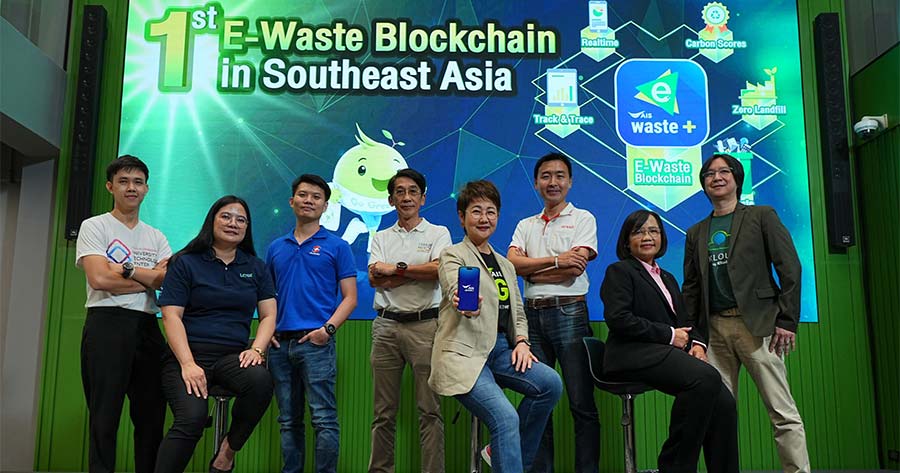The success of a company is not measured only by operating profit, but also by its positive impact on the economy, society and the environment. AIS has adopted a business model focused on leveraging its potential as a digital services provider to make a positive change. Most particularly with the environment, AIS has been determined to create the Ecosystem required to properly dispose of electronic waste, from awareness building to engaging every sector to create the necessary waste collection and recycling processes to achieve Zero Landfill. The operation is run to international standards under the slogan, “Thais say no to E-Waste.”
In the latest developments, the potential of the smart network has been unlocked with Blockchain technology to Redesign the Ecosystem from consumers dropping off waste to the recycling plant, to make E-Waste disposal easier for everyone. The resulting emissions reductions can be viewed on the E-Waste+ platform, the first platform of its kind in Southeast Asia, which has now been launched live with six companies to provide a sustainable solution to E-Waste. This has been achieved by collaboration with the Thailand Greenhouse Gas Management Organization (TGO), which is assisting with international-standard calculations of greenhouse gas emissions generated from recycling E-Waste.
Saichon Submakudom, Head of Public Relations at AIS commented, “In the global context of digital tech becoming part of everyone’s lives, digital devices have proliferated. At AIS, we have taken up two key missions, firstly, to build awareness about the dangers of E-Waste, and secondly, to get involved in processes to collect and dispose of the E-Waste correctly. We have been working with partners to set up drop-off points, from where waste is taken to the recycling process.
We have now taken this to another level to Redesign the Ecosystem enabling organizations to manage their internal E-Waste efficiently, through the network of employees and customers at each company. Everyone can participate in reducing greenhouse gas emissions by bringing E-Waste for recycling to standard on the E-Waste+ platform, which utilizes blockchain technology with a Track and Trace process in place for to query the status of any piece of E-Waste in the entire process. Calculations of E-Waste can then be produced as Carbon Scores so that we know how much emissions we have reduced.”
“Initially, we were working with our partners in the Green Partnership. This is six organizations working on electronic waste management standards. We were able to generate engagement transparently through the blockchain. Denso International Asia (Thailand) Co., Ltd. (DIAT), Chulalongkorn University, Thammasat University, the personal loans company Ngern Tid Lor, the Government Savings Bank and Kasikorn Bank have joined us on the E-Waste+ platform. Our aim is to broaden the message of environmental conservation and address the issue of electronic waste disposal for members of those organisations and wider society,” said Saichon.
Arakin Rakchittapoke, Head of Novel Engine Execution Department at AIS added, “As a leader in digital services on a path to become a Cognitive Tech-co, we see opportunities in capabilities of the Blockchain to bring about real benefits to business. The E-Waste+ platform is an example of using this tech to address important environmental issues.
“Blockchain technology has enabled us to be confident that the E-Waste will make its way to a recycling process that is up to standard and transparent, and fully traceable at every step of the process. It has also become possible to calculate Carbon Scores as an indicator of efforts to reduce greenhouse gas emissions which can be shared on social media and be identified in the Metaverse. AIS has a plan to develop the Carbon Scores arising from the participation of each sector for the correct management of E-Waste, so they can be used as Utility Tokens to further the businesses of participating partner companies.”
Kiatchai Maitriwong, Executive Director of the Thailand Greenhouse Gas Management Organization (TGO) explained further, “We are the core agency tasked with supporting both state and private sectors in efforts to curb Thailand’s greenhouse gas emissions to achieve Net Zero GHG Emissions, and a low-carbon, sustainable economy and society. This includes being a hub of data for greenhouse gas emissions. Nowadays it is not only organisations involved, as the level of public engagement become prominent. Working with AIS has made us see that technology can connect systems with people’s behavior. We can see the volumes of carbon generated in everyday life. We are delighted to be part of developing data and reducing GHG emissions, and deploying digital technology to upgrade platforms calculating the carbon footprints of private individuals, events, and other activities. This includes the calculation of GHGs obtained from the E-Waste recycling process on the E-Waste+ platform, which companies may incorporate into their efforts to address environmental problems sustainably.”
Saichon concluded, “AIS has shown its commitment by standing up to become a hub of relevant knowledge to manage electronic waste since 2019. As a result, we have now taken the process to another level with the capabilities of digital tech. We have been able to integrate the E-Waste management system with Blockchain by working with a diverse range of partners, to reduce electronic waste and promote sustainable development, while being a part of improving the environment and our planet for the better.”
Any company or organization interested in using the E-Waste+ platform and joining the Green Partnership can contact the e-mail address [email protected] or learn additional information from https://ewastethailand.com/





